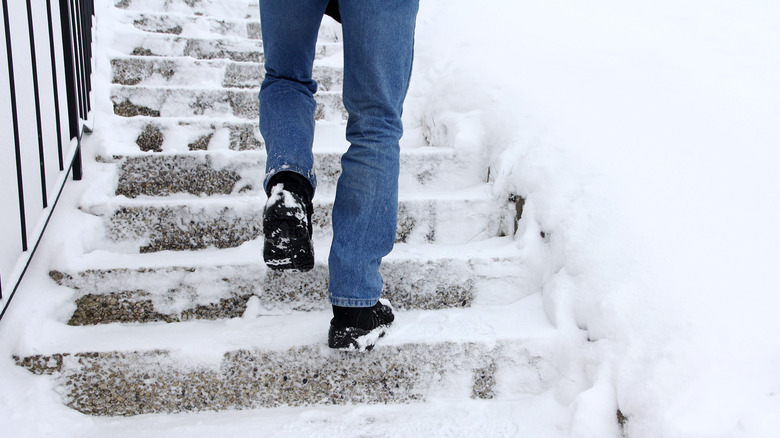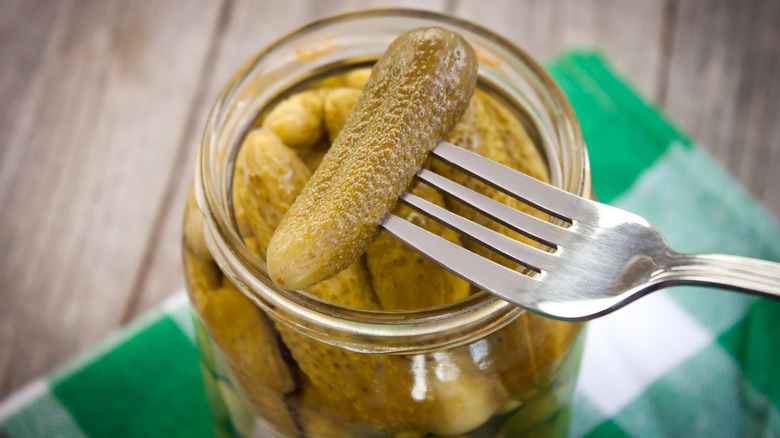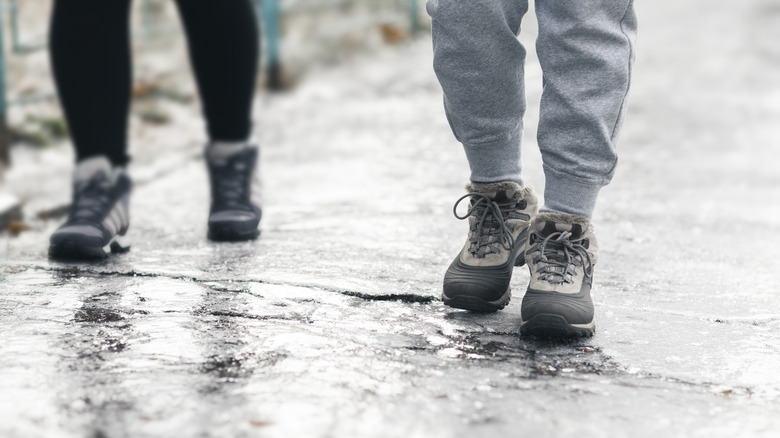An Unexpected Ingredient From Your Fridge Can Deice Steps And Walkways In Winter
Winter brings snow and ice to many areas across the United States. Most people use rock salt or an ice-melt product bought from a home improvement store to melt away ice from steps and walkways. But unprepared homeowners might find themselves in a pickle if a severe storm hits without warning, leaving them without an ice-melting strategy. Fortunately, if you have a jar of pickles in your fridge, you're in luck — you can use the pickle juice to de-ice steps and walkways.
While it's an unconventional way to melt ice, pickle brine (or pickle juice to some people) has a high salt content, making it essentially work like regular salt water. If you find yourself in an icy situation and without rock salt or another ice-melt product, check your fridge for pickles — there are many unexpected ways to use pickle juice around your home and garden, and this is one of the best.
Pickle brine — the unexpected hero
Pickle brine is naturally salty, making it a perfect backup solution for safely getting rid of ice. In fact, states including New Jersey and Minnesota are using pickle juice as an alternative to traditional road salt since it has a lower chloride content, and a lower chloride content means less harm to the plants and animals it comes in contact with.
But how does the salt in pickle brine help combat ice? It disrupts ice crystals, keeping water molecules from bonding to make more ice. This lowers water's freezing temperature and, in turn, helps melt the existing ice. It's important to note, though, that the colder the outside temperature, the less effective this method is, meaning that you'll see better results in 25-degree weather versus zero-degree weather.
Not only is pickle juice useful to throw on ice after it has formed, but treating your sidewalk and steps with pickle juice before ice can settle on it is even more beneficial. Using brine on sidewalks and steps before severe weather helps the salt stick to the surface better, meaning that you can essentially use less of it but still have the same ice-fighting properties.
The sour side of this hack
While this out-of-the-jar hack seems like a winning solution, it does have some limitations and drawbacks. First, and maybe most importantly, using pickle juice on your walkways and steps will make your property smell strongly like, well, pickles. For the dill or gherkin lover, this may not be a problem, but for someone who doesn't love the smell, it can get overwhelming, fast.
And unless you've stockpiled pickles from a wholesale store, you most likely won't have enough pickle juice to make a significant impact in deicing much of anything more than a step or two. For the family that loves pickles this might not be implausible, but for others, having several enormous jars of pickles in their kitchen might not be practical.
Lastly, the salt content from pickle juice can damage vehicles. This damage may not be as significant as the typical retail deicer or rock salt you'll find on highways, but it can still cause metal corrosion if used in high amounts. While it's great to use this unexpected ingredient from your fridge that can even make for a squeaky clean grill, using it around your vehicles might not be the best idea.


